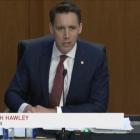Are you happy that gas prices are down to earth again? Good, now’s the perfect time to tax you more for it, if only it wasn’t political suicide to do so.
That’s the tone Washington Post reporter Steve Mufson took in his October 18 business section article “Talk of Raising Gas Tax is Just That.”
“There might be a simple way to trim U.S. oil imports, reduce greenhouse gas emissions, encourage alternatives to petroleum and ease world energy shortages,” the Post writer opened his story. It’s as simple as “raising taxes on gasoline or crude oil,” and “now might be the perfect time to do it without eliciting cries of pain from U.S. drivers,” he suggested.
Going further, Mufson insisted that economists “across the political spectrum think it’s a good idea.” As proof he cited former Bush economic advisor Greg Mankiw as a supporter of a higher gas tax. But a few otherwise conservative economists endorsing the tax hike does not make it unanimous.
The Cato Institute’s Jerry Taylor, for example, has criticized California Proposition 87, a ballot initiative before voters this November that would tax oil produced in the Golden State. Taylor noted that state’s oil would have a ripple effect throughout the United States with higher prices for every American, not just California motorists.
What’s more, Taylor and colleague Peter Van Doren wrote in the October 4 edition of the Orange Count Register, “forcing oil companies to pay higher costs will reduce profit opportunities – and consequently, investment – in California oil extraction and refining. In the long run, less investment equals less supply, and less supply equals higher prices.”
Mufson painted a general anti-tax sentiment among politicians to be motivated chiefly by populism or political timidity, although he featured an opponent of tax hikes that offered an equally government-centered “solution.”
Former Reagan economic adviser Martin S. Feldstein, wrote Mufson, calls for “giving every adult credits on a debit card but capping the overall consumption level” for gasoline. The Post writer added that motorists “could sell spare credits or buy them as needed,” before closing his article with Mankiw scoffing at the notion of creating a new “bureaucracy because politicians are afraid to use the word ‘tax.’”











